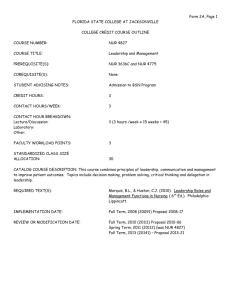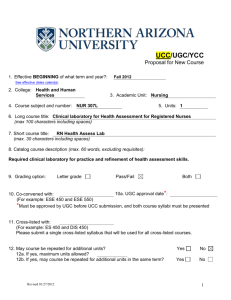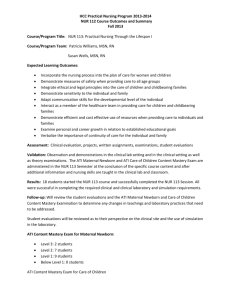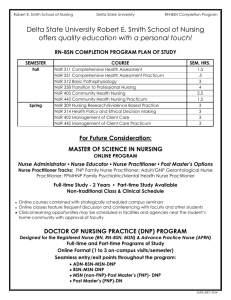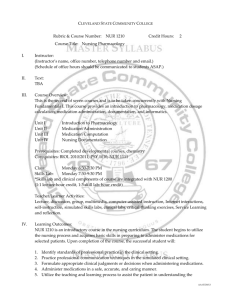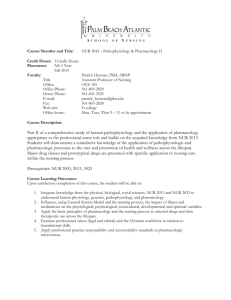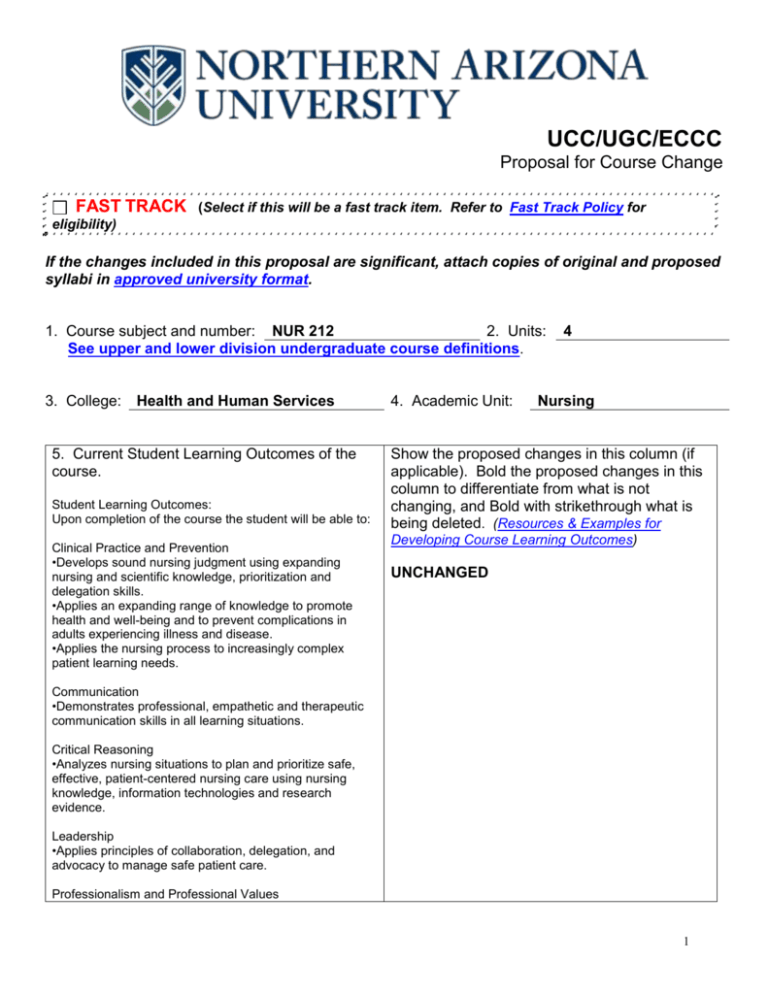
UCC/UGC/ECCC
Proposal for Course Change
FAST TRACK
(Select if this will be a fast track item. Refer to Fast Track Policy for
eligibility)
If the changes included in this proposal are significant, attach copies of original and proposed
syllabi in approved university format.
1. Course subject and number: NUR 212
2. Units:
See upper and lower division undergraduate course definitions.
3. College:
Health and Human Services
5. Current Student Learning Outcomes of the
course.
Student Learning Outcomes:
Upon completion of the course the student will be able to:
Clinical Practice and Prevention
•Develops sound nursing judgment using expanding
nursing and scientific knowledge, prioritization and
delegation skills.
•Applies an expanding range of knowledge to promote
health and well-being and to prevent complications in
adults experiencing illness and disease.
•Applies the nursing process to increasingly complex
patient learning needs.
4. Academic Unit:
4
Nursing
Show the proposed changes in this column (if
applicable). Bold the proposed changes in this
column to differentiate from what is not
changing, and Bold with strikethrough what is
being deleted. (Resources & Examples for
Developing Course Learning Outcomes)
UNCHANGED
Communication
•Demonstrates professional, empathetic and therapeutic
communication skills in all learning situations.
Critical Reasoning
•Analyzes nursing situations to plan and prioritize safe,
effective, patient-centered nursing care using nursing
knowledge, information technologies and research
evidence.
Leadership
•Applies principles of collaboration, delegation, and
advocacy to manage safe patient care.
Professionalism and Professional Values
1
•Demonstrates professional behavior in all learning
situations.
•Applies professional values and their associated
behaviors to the practice of nursing.
•Applies ethical and legal principles and professional
standards to nursing practice.
•Applies caring’s affective characteristics into patientcentered care and with other healthcare professionals.
Global Health:
•Communicates knowledge, values, attitudes and skills of
the nursing profession in a variety of settings.
6. Current title, description and units. Cut and
paste, in its entirety, from the current on-line
academic catalog*
http://catalog.nau.edu/Catalog/.
Show the proposed changes in this column
Bold the proposed changes in this column to
differentiate from what is not changing, and
Bold with strikethrough what is being deleted.
NUR 212 ADULT HEALTH AND ILLNESS II
(4)
Description: This course continues the focus on
nursing care of adults experiencing healthillness transitions. Letter grade only. Course fee
required.
Units: 4
Prerequisite: NUR 208, NUR 208L
Co requisite: NUR 212L, NUR 216, NUR 216L
NUR 212 347 ADULT HEALTH AND
ILLNESS II (4)
Description: This course continues the focus on
nursing care of adults experiencing healthillness transitions. Letter grade only. Course fee
required.
Units: 4
Prerequisite: NUR 208, NUR 208L NUR 345,
NUR 345L
Co requisite: NUR 212L 347L, NUR 216, NUR
216L NUR 349, NUR 349L
*if there has been a previously approved UCC/UGC/ECCC change since the last catalog year, please copy the approved
text from the proposal form into this field.
7. Justification for course change.
NUR 212 and NUR 212L are required in the third semester of the professional program
(second semester junior year). Course number change to upper division better reflects the
course content and how it is currently offered.
8. Effective BEGINNING of what term and year?
FALL 2015
See effective dates calendar.
IN THE FOLLOWING SECTION, COMPLETE ONLY WHAT IS CHANGING
CURRENT
Current course subject and number:
PROPOSED
Proposed course subject and number:
NUR 212
NUR 347
Current number of units:
Proposed number of units:
Current short course title:
Proposed short course title (max 30 characters):
2
Current long course title:
Proposed long course title (max 100 characters):
Current grading option:
letter grade
pass/fail
or both
Current repeat for additional units:
Proposed grading option:
letter grade
pass/fail
or both
Proposed repeat for additional units:
Current max number of units:
Proposed max number of units:
Current prerequisite:
Current co-convene with:
Proposed prerequisite (include rationale in the
justification):
Proposed co-requisite (include rationale in the
justification):
Proposed co-convene with:
Current cross list with:
Proposed cross list with:
Current co-requisite:
9. Is this course in any plan (major, minor, or certificate) or sub plan (emphasis)? Yes
No
If yes, describe the impact. If applicable, include evidence of notification to and/or response
from each impacted academic unit.
Nursing; B.S.N.
10. Is there a related plan or sub plan change proposal being submitted?
If no, explain.
Yes
No
11. Does this course include combined lecture and lab components?
Yes
If yes, include the units specific to each component in the course description above.
No
Answer 12-15 for UCC/ECCC only:
12. Is this course an approved Liberal Studies or Diversity course?
If yes, select all that apply.
Liberal Studies
Diversity
Yes
No
Yes
No
14. Is this course listed in the Course Equivalency Guide?
Yes
No
15. Is this course a Shared Unique Numbering (SUN) course?
Yes
No
13. Do you want to remove the Liberal Studies or Diversity designation?
If yes, select all that apply.
Liberal Studies
Diversity
Both
Both
FLAGSTAFF MOUNTAIN CAMPUS
Scott Galland
Reviewed by Curriculum Process Associate
1/12/2015
Date
3
Approvals:
Department Chair/Unit Head (if appropriate)
Date
Chair of college curriculum committee
Date
Dean of college
Date
For Committee use only:
UCC/UGC Approval
Approved as submitted:
Approved as modified:
Date
Yes
Yes
No
No
EXTENDED CAMPUSES
Reviewed by Curriculum Process Associate
Date
Approvals:
Academic Unit Head
Date
Division Curriculum Committee (Yuma, Yavapai, or Personalized Learning)
Date
Division Administrator in Extended Campuses (Yuma, Yavapai, or Personalized
Learning)
Date
Faculty Chair of Extended Campuses Curriculum Committee (Yuma, Yavapai, or
Personalized Learning)
Date
Chief Academic Officer; Extended Campuses (or Designee)
Date
Approved as submitted:
Approved as modified:
Yes
Yes
No
No
4
CURRENT/PROPOSED SYLLABUS
College of Health and Human Services
School of Nursing
Syllabus
Fall 2014
NUR 212 347
College/Department: College of Health and Human Services: School of Nursing Course Number:
Nursing 212 347
Course Title: Adult Health & Illness II Semester: Fall 2014
Credit Hours: 4 hours weekly in classroom (4 credits)
Instructor and Contact Information:
Ambur Lindstrom-Mette, DNP, FNP-C, RN
All email should be done through the Bblearn course. This is the fastest way to each the Instructor. For Bblearn
outage: Ambur.Lindstrommette@nau.edu
Office Phone: 520-879-7956
Fax: 520-879-7960
Office Address: 3895 N Business Center Drive, Suite 120 Tucson Az. 85705
Prerequisites: NUR 208, NUR 208L NUR 345, NUR 345
Co requisites: NUR 212L, NUR 216, NUR 216L NUR 347L, NUR 349, NUR 349L
Course Description:
This course continues the focus on nursing care of adults experiencing health-illness transitions.
Student Learning Outcomes:
Upon completion of the course the student will be able to:
Clinical Practice and Prevention
•Develops sound nursing judgment using expanding nursing and scientific knowledge, prioritization and
delegation skills.
•Applies an expanding range of knowledge to promote health and well-being and to prevent complications in
adults experiencing illness and disease.
•Applies the nursing process to increasingly complex patient learning needs.
Communication
•Demonstrates professional, empathetic and therapeutic communication skills in all learning situations.
Critical Reasoning
•Analyzes nursing situations to plan and prioritize safe, effective, patient-centered nursing care using
nursing knowledge, information technologies and research evidence.
5
Leadership
•Applies principles of collaboration, delegation, and advocacy to manage safe patient care.
Professionalism and Professional Values
•Demonstrates professional behavior in all learning situations.
•Applies professional values and their associated behaviors to the practice of nursing.
•Applies ethical and legal principles and professional standards to nursing practice.
•Applies caring’s affective characteristics into patient-centered care and with other healthcare professionals.
Global Health:
Communicates knowledge, values, attitudes and skills of the nursing profession in a variety of settings.
Course Structure and Approach:
NUR 212 347 will utilize a variety of approaches to meet the course learning outcomes. These instructional methods
may include but are not limited to the following: lecture, audio-visual material, on-line modules, discussion, group
work, demonstration, clinical experiences, clinical conferences, simulations, case studies, concept maps, written tests
and written assignments.
TEXTBOOKS AND REQUIRED MATERIALS:
Required Textbooks
ALL TEXTBOOKS FROM PREVIOUS NURSING COURSES
**Kee, J. L. (2010). Laboratory and diagnostic tests with nursing implications (8th ed.). Upper Saddle River, NJ:
Prentice Hall.
Lewis, S.L., Dirksen, S.R., Heitkemper, M.M & Bucher, L. (2010). Medical-Surgical Nursing: Assessment and
th
Management of Clinical of Clinical Problems (8 ed.). Mosby/Elsevier. ISBN: 9780323065801
rd
Lynn, P. & LeBon, M. (2011). Taylor’s clinical nursing skills, a nursing process approach (3 ed.).
Philadelphia, PA: Lippinocott.
Maltas, J.L. (2011). Study Guide for Lewis, S.L., Dirksen, S.R., Heitkemper, M.M., Bucher, L., & Camera, I.M. (2011).
th
Medical-Surgical Nursing: Assessment and management of clinical Problems (8 ed.). St. Louis: Elsevier: Mosby.
**Wilson, B.A., Shannon, M.T. & Shields, K.M. (2015). Pearson nurse’s drug guide 2015. Upper Saddle River, New
Jersey: Pearson Prentice Hall.
**YOU MAY USE ANY NURSING DRUG OR LABORATORY/DIAGNOSTIC RESULTS BOOK AS LONG AS IT IS
NOT OVER TWO YEARS OLD.
Recommended Textbooks
American Psychological Association. (2010). Publication manual of the American Psychological Association. (6th ed.).
Washington, DC: American Psychological Association.
Hale, A. & Hovey, M.J. (2013). Fluid and electrolyte notes: Nurse’s clinical pocket guide.
Philadelphia: FA Davis.
LaCharity, L.A., Kumagai, C.K., Bartz, B. (2014). Prioritization, Delegation, and Assignment: Practice Exercises for
rd
the NCLEX Examination (3 ed). Elsevier.
Silvestri, L.A. (2010). Saunders comprehensive review for NCLEX-RN examination (5th ed.).
Philadelphia, PA: W. B. Saunders.
6
nd
Wilson, B.A., Shannon, M.T. & Stang, C.L. (2011). Pearson intravenous drug guide 2011- 2012 (2
ed.). Upper
Saddle River, New Jersey: Pearson Prentice Hall.
Online Requirements
Evolve Online: https://evolve.elsevier.com/ (Case studies, text online resources, SimChart)
Kaplan Resources: https://nursing.kaplan.com/s_login.aspx Blackboard Learn
assignments and readings: http://bblearn.nau.edu
EVALUATION METHODS
Grading System:
Evaluation Tool
Evolve Case Studies: 22@ 1point each, 2 lowest score dropped
Kaplan Tests: 8 @ 2 points each
Points
20
16
Quizzes: 6 @ 5 point each, with lowest score dropped
Global Health Project
Exam 1
Exam 2
Exam 3
Comprehensive Final Exam
Kaplan Exam
TOTAL POSSIBLE POINTS
25
10
50
50
50
75
15
311
NUR 212 347 Final Grades:
The total number of points possible in NUR 212 347is 311.
The minimum point total required to earn each grade is listed below.
Upon completion of all course requirements, the final grade will be calculated as follows
A = 289-311 points
B = 261-288 points
C = 242-260 points
F = anything less than 242 points will be considered a course failure.
NAU, School of Nursing and NUR 212 347 COURSE POLICIES
Lecture
1.
2.
3.
4.
5.
6.
7.
8.
9.
Please see the NAU classroom management statement:
http://nau.edu/uploadedFiles/Administrative/EMSA_Sites/Folder_Templates/_Forms/Classro
om_Disruption_Policy.pdf
Lecture materials, articles, and other information may be found on Blackboard Learn or distributed in
class.
Professional communication and conduct is expected at all times.
Cell phones and pagers are to be turned off for the duration of the class.
No children or visitors are allowed in class/lab at any time.
It is the student’s responsibility to obtain handouts, lecture notes, and information from announcements
in the event a class is missed.
Taping of lectures is permitted in this course. Clinical examples cannot be discussed outside the classroom
due to patient confidentiality.
Students are expected to have read the assigned reading and come to class prepared to discuss the
topics, and to ask relevant questions concerning content.
Students are expected to come to class on time.
7
10.
11.
12.
13.
14.
All assignments and exams are to be completed by each student individually without the help of others unless
specifically identified as a group project or the student is seeking help from a designated NAU tutor or teaching
assistant.
Assignments are due at 11:59 pm Arizona Time on the date they are due. Assignment due dates are printed
on the course schedule. Late assignments will not be accepted unless prior arrangements have been made
with the instructor.
There will be 22 Evolve online case studies assigned. The 2 lowest case study score will be dropped;
therefore, only 20 case studies count toward the case study portion of the grade. The first question submission
and first score of the case study will be recorded as the grade. Please submit your score to the assignment
tool in BBLearn; faculty will finalize the score after item analysis.
No extra credit assignments will be given for this course.
Rounding will NOT be done in Nursing 212 347.
Examinations (Other than Kaplan)
1.
Students must achieve a combined average of 78% on all exams (except Kaplan) to pass the course.
2.
All exam dates and times are printed on the course schedule.
3.
Students will be allotted one and one half (1.5) hours to complete the three major examinations and two (2)
hours to complete the final examination; this includes bubbling in scantron forms. Announcements will be
made when there are 15 and 5 minutes remaining.
4.
Students who are late for exams will not be given extra time.
5.
No examination or test material is to leave the classroom with a student.
6.
Any student determined by faculty to have cheated on the exam will receive a score of zero for that exam
and will be subject to failure from the course.
7.
Retests/makeup tests: Exams will be given only on the date and time scheduled. Make-up examinations,
except for the Kaplan, will be provided only in extraordinary circumstances. The Kaplan exam cannot be
made-up. Students who are absent from an examination for any reason must call the course leader at least 24
hours prior to the examination. Students who do not call before an examination will receive a zero for that
examination and will not be eligible to take a make-up examination except for extreme circumstances. Any
make-up exam must be completed within two business days of the original exam date or at the discretion of
the course coordinator; the final exam must be completed within two business days or by the last day of final
exams, whichever comes first or students may receive a zero
8
on the exam. Make up tests may be in any form (oral, written, essay) over the same objectives as the multiple choice
exam.
8.
Appointments and individual discussion regarding the exam may not be made until item analysis is
complete.
9.
For each exam:
o Cell phones, beepers and other electronic devices must be turned off during exams.
o All books, bags, computers, notes, notebooks, cell phones, water and drink bottles, purses and other
personal belongings will be left at the front of or outside the room.
o Hats and caps are not permitted; ear plugs must be approved by faculty before use.
o Students are expected to stay in the exam room while taking the exam; students may only leave the exam
to use the restroom if they have submitted a note from a health care provider.
o Once you have completed the exam, turn in your exam materials and leave the room quietly; please
move away from the classroom doors.
o Exams may cover material from lecture, textbooks, articles, handouts, websites, discussions,
clinical, lab, previous, and concurrent courses.
o Pencils with erasers, scantron forms, and calculators will be provided.
o Exam dates, times, and locations are subject to change.
o Students are strongly encouraged to meet with faculty if they receive C or lower on an exam.
11.
The final examination will be comprehensive.
Course policies
Policies and guidelines in the NUR 212 347 course syllabus apply to all aspects of this course. You are responsible for
review and compliance with NUR 212 347, NAU School of Nursing, and NAU policies. You are also responsible for
review and adherence to the professional standards and rules of the Arizona Nurse Practice Act, the State Board of
Nursing, and the American Nurses’ Association Code of Ethics. For full descriptions of policies, visit these websites:
Current NAU SON BSN Handbook:
http://nau.edu/uploadedFiles/Academic/CHHS/Nursing/BSN_Handbook.pdf
Arizona Nurse Practice Act: http://www.azbn.gov/NursePracticeAct.aspx
American Nurses Association Code of Ethics:
http://www.nursingworld.org/MainMenuCategories/EthicsStandards/CodeofEthicsforNurses.a spx
Social Media Guidelines: https://www.ncsbn.org/2930.htm
Attendance Policy
Successful achievement of course outcomes is facilitated by regular class attendance and active engagement in the
learning process. Should an absence be unavoidable, the student shall notify the instructor according to instructions
provided in the course syllabus. Students are responsible for completion of any missed work in accordance with
course policies.
Withdrawal Policy
If a student is unable to attend the course or must drop the course for any reason, it will be the responsibility of the
student to withdraw from the course before the withdrawal deadline (see current NAU Schedule of Classes for
deadline: http://nau.edu/Registrar/Important-Dates/Fall/ - “Session Deadlines”).
Plagiarism, Cheating, and Academic Dishonesty:
Please refer to Appendix G of the NAU Student Handbook
(http://home.nau.edu/images/userimages/awf/9476/ACADEMIC%20DISHONESTY.pdf) for definitions, policies,
penalties, and procedures related to various forms of academic dishonesty.
University Policies
Review the following policies available on the Northern Arizona University Policy Statement website
(http://www4.nau.edu/avpaa/policy1.html):
1. Safe Environment Policy
2. Students with Disabilities Policy
Effective Fall 2012
3. Academic Contact Hour Policy
4. Academic Integrity Policy (also see
http://home.nau.edu/images/userimages/awf/9476/ACADEMIC%20DISHONESTY.pdf)
5. Research Integrity Policy
6. Sensitive Course Materials Policy
7. Classroom Disruption Policy (also see
http://nau.edu/uploadedFiles/Administrative/EMSA_Sites/Folder_Templates/_Forms/Classro
om_Disruption_Policy.pdf)
The Impaired Student policy will be strictly adhered to; there will be no tolerance in for any evidence of substance
abuse.
NUR 212 347 Course Outline Schedule-Spring 2014
Week Date
Topic
Delivery
Chapters & Articles
1
2
1/16
8am12pm
1/23
3
1/30
4
1/30
1/30
1/30
1/30
2/6
5
2/6
2/13
6
2/13
2/13
2/20
7
8
2/20
2/20
2/20
2/20
2/20
2/27
3/6
10
11
3/6
3/13
3/13
3/20
3/27
12
3/27
3/27
3/27
4/3
9
4/3
4/3
4/3
Effective Fall 2012
Orientation to 212 347, Delegation
Respiratory Problems, Respiratory
Assessment, Upper
Respiratory: Upper & Lower Problems,
Obstructive Pulmonary Disease
Obstructive Pulmonary Disease (cont)
Respiratory Failure and ARDS
COPD Case Study
Lung Cancer Case Study
Kaplan Respiratory I Test
Kaplan Respiratory II Test
Exam #1
Weeks 1-3
Cardiovascular: HTN, CAD, ACS
Cardiovascular: HTN, CAD, ACS
Dysrhythmias
CAD Case Study
Hypertension Case Study
Heart Failure, Inflammatory & Structural
Heart Disorders & Vascular Disorders
DVT Case Study
PVD Case Study
Heart Failure Case Study
Cardiovascular I Kaplan Test
Cardiovascular II Kaplan Test
Shock
Exam #2
Weeks 4-7
Hematology
Nervous System: ICP, Stroke,
Brain Attack Case Study
Spring Break—No Lecture
Chronic Neurological Problems, Peripheral
Nerve and Spinal Cord
Parkinson’s Disease Case Study
Seizure Disorder Case Study
Hematology-Immune Kaplan Test
Peripheral Nerve and Spinal Cord cont.
Nutritional Problems
Lecture
Syllabi
Lewis 26-27
Lecture
Lewis: 27-29
Lecture
Lewis 29&68
Case Study
Case Study
Evolve
Evolve
Kaplan
Kaplan
Spinal Cord Injury Case Study
Head Injury Case Study
Myasthenia Gravis
8am-10am
Lecture
Lecture
Lewis 32-34
Lewis 32-34,36
Case Study
Case Study
Lecture
Evolve
Evolve
Lewis 35, 37 &38
Case Study
Case Study
Case Study
Evolve
Evolve
Evolve
Kaplan
Kaplan
Lewis 67
Lecture
8am-10am
Lecture
Lecture
Case Study
Lewis 30-31
Lewis 56-58& 60
Evolve
Lecture
Lewis 59&61
Case Study
Case Study
Lecture
Evolve
Evolve
Kaplan
Lewis 59 & 61
Case Study
Case Study
Case Study
Lewis 39-42
Evolve
Evolve
Evolve
14
4/10
4/10
4/17
15
4/17
4/17
4/17
4/17
4/17
4/17
4/24
16
4/24
4/24
4/24
5/1
Guillain-Barre Syndrome
Neurology Kaplan Test
Exam #3
Weeks 8-12
Gastrointestinal: Nutritional Problems &
Upper GI Problems
Colonoscopy Case Study
Peptic Ulcer Case Study
Upper & Lower Gastrointestinal Problems
and Liver Pancreas and Biliary Tract
Problems
Irritable Bowel Disease Case Study
Chronic Pancreatitis Case Study
Cirrhosis Case Study
Hepatitis Case Study
Gastrointestinal System I Kaplan Test
Gastrointestinal System II
Emergency, Terrorism and Disaster Nursing
and
Mock Code
Female Reproductive Problems
Cervical Cancer Case Study
Breast Cancer
Kaplan Exam
17
5/8
Comprehensive Final Exam
13
4/3
4/3
4/10
4/10
Effective Fall 2012
Case Study
11am-1pm
Evolve
Kaplan
8am-10am
Lecture
Lewis 39-42
Case Study
Case Study
Lecture
Evolve
Evolve
Lewis 42-44
Case Study
Case Study
Case Study
Case Study
Evolve
Evolve
Evolve
Evolve
Kaplan
Kaplan
Lewis 69
Lecture &
Simulation Lab
Self Study
Case Study
Case Study
8am-10am
Chapter 54
Evolve
Evolve
Computer Room
NAU Prince Campus

